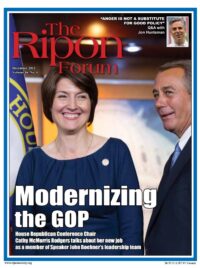
While the debate rages over whether the GOP should view this as a message problem, a messenger problem, or a math problem, I wanted to underscore the challenge facing us from a math perspective – i.e., why it is important that we work hard to improve with Hispanics.
As a party, we outright won swing voter groups, but lost the election. That’s staggering.
This post also takes a look at the implications for polling going forward.
The New Electoral Math
The exit pollsters asked which was the most important candidate quality – vision for the future (29%), shares my values (27%), cares about people like me (21%), and strong leader (18%).
Mitt Romney won three of the four qualities. Voters who selected vision opted for Romney 54%-45%. Those who picked values preferred Romney 55%-42%. Voters focused on strong leadership opted for Romney 61%-38%. Romney lost 18%-81% among voters who said “cares about people like me” to Barack Obama.
Thus, Romney controlled leadership, vision, and values, yet still lost, because he got blown out on the empathy dimension. This may well have been the first Presidential election where the winner on leadership lost the election anyhow. Prior to the election, if you had said that Romney would win among the 74% of voters choosing those three qualities and would still lose overall, you would not have been believed.
This may well have been the first Presidential election where the winner on leadership lost the election anyhow.
Also, asked which of four was the most important issue, an overwhelming 59% picked the economy. Romney won those voters 51%-47%. Thus, he won the most important issue, but still lost the election.
But the demographics are even more concerning for the GOP down the road. Here are some of the stunning demographic findings from the exit polls about the Presidential election:
- Mitt Romney won Independents by five points. That’s better than George W. Bush in 2004 by six net points (see more on that below).
- Mitt Romney won middle income voters ($50-100k) by six points. George W. Bush won them by twelve points in 2004, but there were far fewer voters earning more than $100k in the 2004 election (18%) than in 2012 (28%).
- Mitt Romney won white women by 56%-42% (the “war on women” is overstated; Romney got crushed with minority women but a fourteen point win is not exactly a decisive defeat with white women). George W. Bush won white women by eleven points in 2004, a net three points weaker than Romney.
- Mitt Romney won white voters by 59%-39%, which is better than George W. Bush in 2004 by three net points.
- Mitt Romney won voters age 40+ by five points. There is no direct comparison to Bush in 2004, but Bush did win voters 45+ by five points.
So, Romney won many of the groups that are generally considered to be the ones to decide elections – Independents, white women (by double digits), middle income, and voters age 40+. Mitt Romney put together a coalition that just eight years ago would have won the presidential election (hence the data comparisons to George W. Bush). However, instead of whites being 77% of the electorate, they were 72% of the electorate. Instead of Republicans and Democrats being equal, Democrats far outnumbered Republicans, and washed out Romney’s advantage among Independents. Bush kept it close with younger voters (under age 40), while Obama won them decisively.
Underscoring that there are considerably more Democrats than Republicans, Romney was the first national candidate in exit polling history to decisively win Independents and lose the election (John Kerry won Independents, but by just one point).
So, if you win the swing groups but lose the election, that means the Democrats have a clear home field advantage. There are more Democrats. That underscores that we have to do better as a party with Hispanics. It will be hard to push white voter support for Democrats lower than 39% (which is all Obama got). Thus, to have a chance, Republicans have to appeal to Hispanics. It’s simple math, but it’s hard to do. We have to start today.
To have a chance, Republicans have to appeal to Hispanics.
The Impact on Polling
This is what winning swing voters and losing the election means for polling in the future:
We have to complete more interviews with cell phone respondents. We have been doing cell phone interviewing for several cycles now, but really increased it this year with cell phone interviewing not only at the national and statewide level, but also at the congressional level. What we do know now is that twenty percent of the interviews with cell phones was not enough. It will increase costs, but as a party we have no choice.
We need to include more younger voters in our samples. I shot for a 40-42% share of the electorate being ages 18-44, when it turned out to be 46%. That may not sound like much of a difference, but given how Democratic younger voters are, it mattered. This will also increase costs (younger voters are harder to reach), but again, we have no alterenative. The numbers will not be the same in the off-year, but it will still be higher than most people think.
We need to poll through the final weekend. Many campaigns stopped polling ten to fourteen days out. Republicans lost those who decided their vote for Congress in November by a 41%-56% margin. We can’t afford to lose the end game in the future and need to know those trends rather than assume late deciders will split evenly. Late polling is not just for curiosity’s sake. Campaigns can adjust messaging, radio, voter contact, and even where the candidate goes in the final 48 hours.
We need to increase the numbers of Hispanics in our sample. It was easy to project that African Americans would replicate their 2008 turnout levels (and they did). I also projected that Hispanic turnout would be 10% nationally (and it was), but it was much harder to project the Hispanic number for states and districts. That’s important to get right in 2014, 2016, and beyond. We have routinely conducted Spanish language interviewing in this cycle and previous cycles, but we need to increase the number of states and districts where it is done as a matter of course. It also affects cost, but the continued growth in the share of the vote that is Hispanic means it is important.
Glen Bolger is a partner and co-founder of Public Opinion Strategies. He is also, in the words of political expert Charlie Cook, “the one pollster Republicans should listen to” in the wake of the Nov. 6th general election. This post originally appeared on his firm’s TQIA Blog, and is reprinted in the Forum with his permission.




